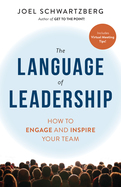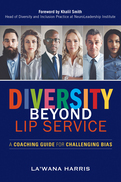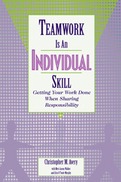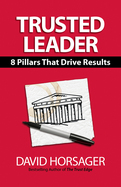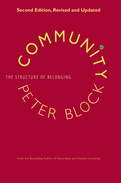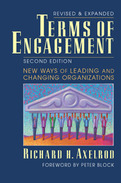Search Results: "how to be an inclusive leader"
Results 55-60 of 734
Convey the essence of leadership with every communication.
Everything you communicate has the power to secure or sabotage your impression. But while you may be an empathic, visionary, responsive, inspiring, authentic, supportive, and humble leader, the lasting impact of those qualities hinges on your ability to communicate them effectively in words and expressions.
Drawing on his decades of experience as a presentation coach, executive speechwriter, and national champion public speaker, Joel Schwartzberg offers unique mindsets, actionable tactics, and diverse examples to help you leverage the most powerful leadership tool you have: your voice. Whether you're giving speeches, telling stories, sending emails, posting messages, recording videos, or running Zoom meetings, these are essential practices for establishing authority and engaging your audience.
The Language of Leadership will show you how to inspire, not merely inform, communicate with purpose and power, and sell—not just share—your most important ideas.
Everything you communicate has the power to secure or sabotage your impression. But while you may be an empathic, visionary, responsive, inspiring, authentic, supportive, and humble leader, the lasting impact of those qualities hinges on your ability to communicate them effectively in words and expressions.
Drawing on his decades of experience as a presentation coach, executive speechwriter, and national champion public speaker, Joel Schwartzberg offers unique mindsets, actionable tactics, and diverse examples to help you leverage the most powerful leadership tool you have: your voice. Whether you're giving speeches, telling stories, sending emails, posting messages, recording videos, or running Zoom meetings, these are essential practices for establishing authority and engaging your audience.
The Language of Leadership will show you how to inspire, not merely inform, communicate with purpose and power, and sell—not just share—your most important ideas.
"La'Wana Harris has opened this coach's eyes to the power of coaching practices to create new paths for diversity and inclusion work—whether or not you are formally trained as a coach. Please read this book and help create workplaces with honest engagement and access for all."
—Marshall Goldsmith, Thinkers 50 #1 Executive Coach and two-time #1 Leadership Thinker in the world
The ugly truth about diversity is that some people worry they must give up their power for others to have a chance. La'Wana Harris's Inclusion Coaching method helps people realize that sharing power isn't the same as losing it.
The elephant in the room with diversity work is that people with privilege must use it to allow others equal access to power. This is often why diversity efforts falter—people believe in diversity until they feel that they have to give something up. How do we talk them through this shift?
La'Wana Harris introduces Inclusion Coaching, a new tool based on cutting-edge research that identifies the stages of preparation, implementation, and “self-work” necessary to help individuals, teams, and organizations build a sustainable culture of inclusion. Harris's six-stage COMMIT model—Commit to courageous action, Open your eyes and ears, Move beyond lip service, Make room for controversy and conflict, Invite new perspectives, and Tell the truth even when it hurts—provides a proven process for making people aware of their own conscious and unconscious biases and concrete steps to make inclusion an embedded reality.
Harris offers managers and diversity coaches new models to empower everyone from employees to CEOs to “do” inclusion and address deep-rooted biases that are often invisible. She addresses the growing need to challenge bias and build authentic cultures where everyone can feel a sense of belonging.
—Marshall Goldsmith, Thinkers 50 #1 Executive Coach and two-time #1 Leadership Thinker in the world
The ugly truth about diversity is that some people worry they must give up their power for others to have a chance. La'Wana Harris's Inclusion Coaching method helps people realize that sharing power isn't the same as losing it.
The elephant in the room with diversity work is that people with privilege must use it to allow others equal access to power. This is often why diversity efforts falter—people believe in diversity until they feel that they have to give something up. How do we talk them through this shift?
La'Wana Harris introduces Inclusion Coaching, a new tool based on cutting-edge research that identifies the stages of preparation, implementation, and “self-work” necessary to help individuals, teams, and organizations build a sustainable culture of inclusion. Harris's six-stage COMMIT model—Commit to courageous action, Open your eyes and ears, Move beyond lip service, Make room for controversy and conflict, Invite new perspectives, and Tell the truth even when it hurts—provides a proven process for making people aware of their own conscious and unconscious biases and concrete steps to make inclusion an embedded reality.
Harris offers managers and diversity coaches new models to empower everyone from employees to CEOs to “do” inclusion and address deep-rooted biases that are often invisible. She addresses the growing need to challenge bias and build authentic cultures where everyone can feel a sense of belonging.
Knowing how to work effectively in and through groups may be the single most important skill anyone can develop in today's collaborative, team-based workplace. Unfortunately, all of the resources available on teamwork put the emphasis on group process and ignore the role of-and benefits to-the individual. But effective teamwork isn't only a group skill set; it's an individual skill set as well. Teamwork Is an Individual Skill shows readers how to develop the skills to thrive on any team, under any circumstances. No longer will readers find themselves complaining, "I got assigned to a bad team." Instead, they'll know what to do to make any team work for them.
Drawing on over twenty years of experience successfully developing professional teams in product development, R&D, and high-tech environments, Christopher Avery and his coauthors use brief thought-provoking essays, personal and teambuilding exercises, case studies, and insights from business leaders to teach readers how to build responsible and productive relationships at work. The authors show how and why your ability to assume personal responsibility-for your own work on a team and for the team's collective work-is the most important factor in ensuring a productive team experience.
Teambuilding, the authors point out, is essentially a series of conversations between people who share responsibility to get something done. Teamwork Is an Individual Skill describes the way these conversations typically progress, and shows the reader how to predict and direct these conversations so that they can maximize the benefits to both themselves and to their team.
Designed for easy access and for use by both individuals and groups, Teamwork Is an Individual Skill will equip readers with the mental skills and behaviors that will help them achieve personal goals while contributing to their team's success.Knowing how to work effectively in and through groups may be the single most important skill anyone can develop in today's collaborative, team-based workplace. Unfortunately, all of the resources available on teamwork put the emphasis on group process and ignore the role of-and benefits to-the individual. But effective teamwork isn't only a group skill set; it's an individual skill set as well. Teamwork Is an Individual Skill shows readers how to develop the skills to thrive on any team, under any circumstances. No longer will readers find themselves complaining, "I got assigned to a bad team." Instead, they'll know what to do to make any team work for them.
Drawing on over twenty years of experience successfully developing professional teams in product development, R&D, and high-tech environments, Christopher Avery and his coauthors use brief thought-provoking essays, personal and teambuilding exercises, case studies, and insights from business leaders to teach readers how to build responsible and productive relationships at work. The authors show how and why your ability to assume personal responsibility-for your own work on a team and for the team's collective work-is the most important factor in ensuring a productive team experience.
Teambuilding, the authors point out, is essentially a series of conversations between people who share responsibility to get something done. Teamwork Is an Individual Skill describes the way these conversations typically progress, and shows the reader how to predict and direct these conversations so that they can maximize the benefits to both themselves and to their team.
Designed for easy access and for use by both individuals and groups, Teamwork Is an Individual Skill will equip readers with the mental skills and behaviors that will help them achieve personal goals while contributing to their team's success.
- The first book to identify the individual-rather than group-behavior skills vital to every team's success
- Offers specific strategies followed by application exercises to help readers be powerful and thrive in teams, partnerships, and collaborations
- Reveals step by step how readers can be achieve outstanding business results through building responsible, effective, and productive relationships at work
Trusted Leader
2021
Without trust, people and businesses fail. Trusted Leader provides a framework for building trust so that you and your organizations can perform at your best.
“A lack of trust is your biggest expense,” says Wall Street Journal bestselling author David Horsager. Without trust, transactions cannot occur. Without trust, influence is destroyed. Without trust, leaders lose their people. Trust can be either your most vulnerable weakness or your greatest asset.
Horsager introduces readers to his Eight Pillars of Trust through the journey of a senior leader who thought success was certain. Follow CEO Ethan Parker as he discovers the power of trust and how to apply it amid the complexities of leadership, change, and culture transformation.
The Eight Pillars of Trust (Clarity, Compassion, Character, Competency, Commitment, Connection, Contribution, and Consistency) are based on Horsager's original research and extensive experience working with Fortune 500 companies and top government agencies around the globe. In addition to the business parable, this book is rich in practical advice for implementing each of the Eight Pillars. You will learn strategies to increase alignment, overcome attrition, and get absolutely clear on executing your top priorities. Horsager offers a road map for how to become the most trusted expert in your industry.
“A lack of trust is your biggest expense,” says Wall Street Journal bestselling author David Horsager. Without trust, transactions cannot occur. Without trust, influence is destroyed. Without trust, leaders lose their people. Trust can be either your most vulnerable weakness or your greatest asset.
Horsager introduces readers to his Eight Pillars of Trust through the journey of a senior leader who thought success was certain. Follow CEO Ethan Parker as he discovers the power of trust and how to apply it amid the complexities of leadership, change, and culture transformation.
The Eight Pillars of Trust (Clarity, Compassion, Character, Competency, Commitment, Connection, Contribution, and Consistency) are based on Horsager's original research and extensive experience working with Fortune 500 companies and top government agencies around the globe. In addition to the business parable, this book is rich in practical advice for implementing each of the Eight Pillars. You will learn strategies to increase alignment, overcome attrition, and get absolutely clear on executing your top priorities. Horsager offers a road map for how to become the most trusted expert in your industry.
Community
2018
As a response to the increasing violence in our culture, the widening ideological divides, and the growing gap in economic well-being, there is greater awareness that a deeper sense of community is desperately needed. But even as we acknowledge the need to build community, the dominant on-the-ground practices about how to engage people, civically and organizationally, remain essentially unchanged. We still believe community is built with better messaging, more persuasion, and social events for people to get to know each other better. All of which is naïve.
In this new edition, Block draws on a decade of putting these ideas into practice to emphasize what has worked and extract those thoughts that were nice but had no durability. He explores how technology, instead of bringing us together, has driven us into more isolation. New examples show that community building can be a more powerful way to address social problems than more traditional policies and programs. And encouragingly, Block insists this is really simple, once we decide it is essential. He offers a way of thinking that creates an opening for authentic communities to exist and details what each of us can do to make that happen.
In this new edition, Block draws on a decade of putting these ideas into practice to emphasize what has worked and extract those thoughts that were nice but had no durability. He explores how technology, instead of bringing us together, has driven us into more isolation. New examples show that community building can be a more powerful way to address social problems than more traditional policies and programs. And encouragingly, Block insists this is really simple, once we decide it is essential. He offers a way of thinking that creates an opening for authentic communities to exist and details what each of us can do to make that happen.
Terms of Engagement
2010
Building engagement is crucial for every organization. But the traditional top-down coercive change management paradigm—in which leaders “light a fire” under employees—actually discourages engagement.
Richard Axelrod offers a better way. After debunking six common change management myths, he offers a proven, practical strategy for getting everyone—not just select committees or working groups—enthusiastically committed to organizational transformation. This revised edition features new interviews—everyone from the vice president of global citizenship at Cirque du Soleil to a Best Buy clerk—and new neuroscience findings that support Axelrod's model. It also shows how you can foster engagement through everyday conversations, staff meetings, and work design.
Richard Axelrod offers a better way. After debunking six common change management myths, he offers a proven, practical strategy for getting everyone—not just select committees or working groups—enthusiastically committed to organizational transformation. This revised edition features new interviews—everyone from the vice president of global citizenship at Cirque du Soleil to a Best Buy clerk—and new neuroscience findings that support Axelrod's model. It also shows how you can foster engagement through everyday conversations, staff meetings, and work design.


